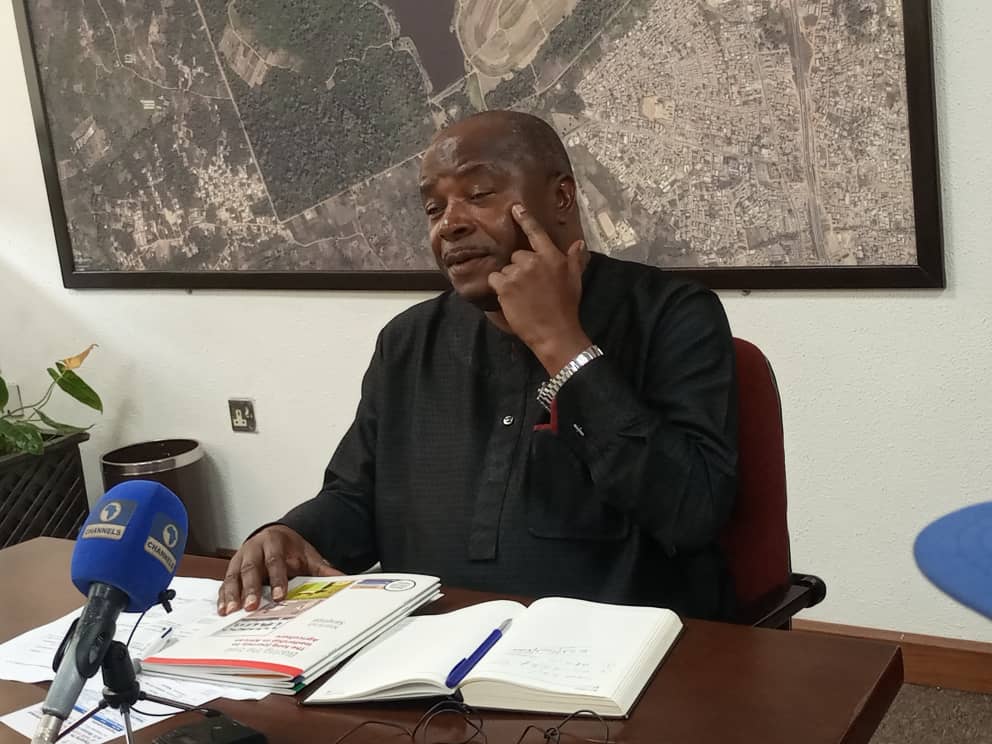Nteranya Sanginga, director-general of the International Institute of Tropical Agriculture (IITA), says the federal government’s allocation for agriculture is way less than what it needs to develop the sector.
Speaking with journalists on Thursday, Saginga said African leaders have not made adequate financial commitment towards advancing agriculture.
In May 2021, President Muhammadu Buhari said his administration’s investment in the sector had yielded visible results, adding that the future of Nigeria is in agriculture.
Under the Buhari administration, budgetary allocation for agriculture was 1.70 percent in 2017, 2 percent in 2018; then it fell to 1.56 percent in 2019, and 1.34 percent in 2020. In 2021, it slightly increased to 1.37 percent.
Advertisement
In the 2022 budget, N291.4 billion (1.8 percent) was allocated to the sector. This includes N71.8 billion for personnel cost, N3.7 billion for overhead and N215.8 billion for capital expenditure.
Commenting on the budgetary allocation, Sanginga said the federal government cannot develop agriculture “with that kind of investment”.
Sanginga, who is the first African DG of the institute, called on African leaders to start viewing agriculture as a business rather than a social activity.
Advertisement
“Some of the major programmes we created here include the youth programme, STEP, which the governor of Oyo state has really embraced. Analysing all of that, I think the missing link is the political dimension,” Sanginga said.
“In Africa, you hear every head of state say agriculture is a priority but when you go to the budget, agriculture is the least of the budget.
“African leaders are not serious about agriculture at all. I’d say almost 90 percent of the countries in Africa still consider agriculture as a social activity, so they are waiting for donors, foreigners to finance agriculture with grants. You can never be serious with that.”
HOW IITA’s BIOTECHNOLOGY ‘CAN BOOST YAM PRODUCTION’
Advertisement
Morufat Balogun, a geneticist and tissue culture specialist of the Yam Improvement for Income and Food Security in West Africa (YIIFSWA), said the federal government can help local farmers by keying into the institute’s biotechnology methods of producing yam seedlings.
Balogun explained that yam seedlings produced using biotechnology have lesser harvest time, and are less prone to soil-borne diseases, consequently increasing harvest yield.
She said the technology can provide employment for youths and also reduce hunger and poverty in the country.
“We clean what farmers are using on their fields from all the diseases. We produce those small tiny plantlets, we bring them here to plant in aeroponics — it means that feeding plants with mixed nutrients like spraying nutrients to the roots of plants. If you look at the crops, there is no soil, it is only water mixed with nutrients– it is like breastmilk, we have put everything inside,” Balogun said.
Advertisement
“The advantage is that it avoids soil infestation from soil-borne diseases. It produces tubers under and canopies on top. And each node like this is able to give 300. While aeroponics is giving us up to 300 per plant, hydroponics is giving us up to 120-150 per plant.
“This technology is not directly to the farmers. There are middlemen. This is a research institute. From here to the private seed companies which are registered companies and after that, it goes to the seed entrepreneurs that produce the certified seeds and then it goes to the farmers. Those stages need time and we are out scaling. This started in 2017. The first stage was research when we standardised this process between 2011 and 2016 and the donor, which is the Gates Foundation, said we should commercialise these technologies.
Advertisement
“Two years ago, we had 11 million demands for seed and we could not provide up to 500,000. So, there is a lot of potential for youth empowerment if this technology is further adopted.
“We want the government to support farmers’ groups. They want the planting materials but IITA on her own cannot provide the number of seed demands. Government can support by giving them input and subsidising the cost of planting materials.”
Advertisement
Asked how Nigeria can improve food security, Sanginga said another advantage of IITA’s biotechnology is that it helps farmers avoid the security issues associated with farming in the forests.
Advertisement
Add a comment







